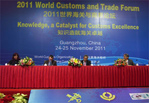The CITES Secretariat contributed to discussions on the effective use of knowledge and information management in the development of global networks and export and import documents.
John Scanlon, CITES Secretary-General, said knowledge management in harmonizing CITES' electronic resources allowed Parties to more effectively meet their obligations under the Convention.
 25 November 2011: Participants in the World Customs and Trade Forum discussed knowledge management and new ways to share and access information on customs policies and private sector practices, with the Secretariat of the Convention on International Trade in Endangered Species of Wild Fauna and Flora (CITES) contributing as a panel member on the effective use of knowledge and information management in CITES’ work.
25 November 2011: Participants in the World Customs and Trade Forum discussed knowledge management and new ways to share and access information on customs policies and private sector practices, with the Secretariat of the Convention on International Trade in Endangered Species of Wild Fauna and Flora (CITES) contributing as a panel member on the effective use of knowledge and information management in CITES’ work.
The Forum took place in Guangzhou, China, from 24-25 November 2011, organized by the World Customs Organization (WCO). The CITES Secretariat was part of the Panel on “Intelligence Driven Risk Management; Crucial to Industry and Customs,” and elaborated on knowledge management in the development of global networks, CITES export and import documents, CITES business processes, the inclusion of CITES e-permitting standards in the World Customs Organization Data Model, and establishing harmonized national CITES e-permitting systems as well as e-learning tools to build capacity at the national level. As an example, CITES noted the partnership between the International University of Andalusia in Spain, in the development of the CITES Virtual College. John Scanlon, CITES Secretary-General, added that one of the benefits of knowledge management in harmonizing CITES’ electronic resources is that Parties can more effectively meet their obligations under the Convention. [CITES Press Release] [Website of World Customs and Trade Forum]